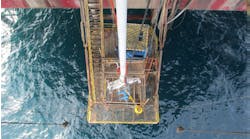Opinion: Nigeria needs to take the leap toward adopting digital twins
Editor's note: This story first appeared in the May-June 2023 issue of Offshore magazine as part of the Remote Inspections & Operations Special Report.
By Adeshina Adebusuyi, James Fisher AIS
The digital transformation in Africa is advancing in leaps and bounds, with Nigeria leading the charge as home to the most technology hubs across the continent.
Despite this technology spike, Nigeria’s energy industry is lagging behind its global peers putting its ambition to be a gas-powered economy by 2030 at risk.
Nigeria’s oil and gas potential could unlock economic prosperity and lift millions out of energy poverty. Previously hampered by a lack of oil and gas infrastructure, progress is finally being made in Nigeria following former President Buhari’s "Decade of Gas Initiative," alongside the long-awaited reforms delivered through the Petroleum Industry Act.
Despite planned projects, such as the Dangote refinery and several LNG plants, Nigeria’s checkered history with the use of digital technology within the offshore oil and gas industry could jeopardize this potential success story with many companies becoming disillusioned by digital transformation.
Pitfall of digital distrust
Most oil and gas decision makers were sold a vision of digital transformation; however, these purchases not only failed to improve output, but also did not solve the challenges they were bought to resolve. It has become an all-too-common pitfall, engineered by unscrupulous sales teams, leading to distrust and hesitance in adopting new innovations that would have a positive impact.
While industry leaders elsewhere are benefiting from the latest innovations in digital twins, data analytics and remote maintenance, many Nigerian workers are working from incomplete plans and Excel spreadsheets. They waste lots of time looking for data siloed across several systems—or worse, not captured at all, residing solely in colleagues’ memories.
Overcoming digital disillusionment
The challenge of balancing the volatility of oil price with maintaining margins means that digital transformation is often overlooked. Without it, Nigeria’s domestic supply and exports may rise, and economic prosperity will not be unlocked to the fullest potential. To mend the rift created by digital disillusionment, operators need a new approach to digital transformation and an increased focus on maximizing the good times and minimizing the downturns.
James Fisher AIS’s rollout of its R2S digital twin technology is one example of how Nigeria is benefitting from a different approach through collaborative partnerships and offering a compelling alternative to previous digital transformation attempts, while also building mutual trust and understanding.
The key to putting theory into action is establishing a culture shift away from the traditional business model that relies on quickfire sales. The focus must instead be on establishing long-term partnerships with oil and gas companies to jointly mitigate their valuable concerns through consultative engagements.
With the investment almost equal for both partners, Nigerian oil and gas companies can have renewed confidence in adopting emerging technologies such as data analytics, digital twin and predictive maintenance. This approach lends itself to being scalable and adaptable. Those hesitant to give digital transformation another try can start with a small amount of change and then scale that change up on the back of success.
Those companies that have taken the leap toward adopting digital twins can now present 2D data, visual data and real-time data in a real-world context, allowing teams to plan better and swiftly make important operational decisions. Data that were once siloed, outdated and disconnected has become useful, robust and accurate, providing visibility to the remotest of assets.
Knowledge transfer
Finally, creating opportunities for knowledge transfer means that Africa’s oil and gas industry can confidently champion its digital transformation. Making this vision a reality, James Fisher AIS is delivering a training school in Angola that equips new industry recruits with the digital skills needed to operate oil and gas assets efficiently. It also opened headquarters in Lagos, giving companies direct access to experts that understand the region’s specific needs and its digital heritage.
Overcoming the gaps in digital transformation through collaborative partnerships will be paramount if Nigeria is to fully benefit from the forthcoming boom in oil and gas infrastructure and be considered as an industry heavyweight on the world stage.



